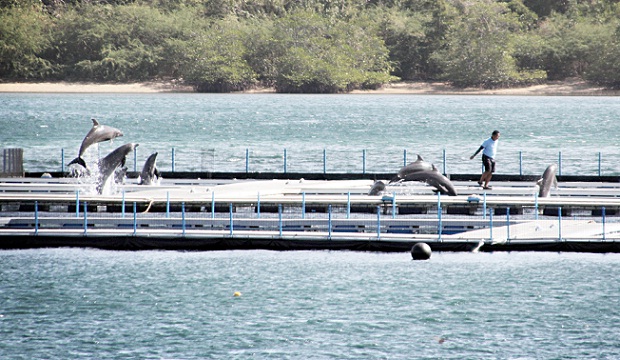The Quezon City Regional Trial Court ruled Wednesday against extending the 72-hour Temporary Environmental Protection Order (TEPO) served last Friday to stop the issuance of export permits for the dolphins currently being kept and trained at the Ocean Adventure Park in Subic Bay.
“We will file a motion for reconsideration. The case will proceed although the ‘hold departure order’ on the dolphins has been lifted,” Trixie Concepcion, Earth Island Institute Regional Director for Asia, said.
The legal representative for Resorts World Sentosa in Singapore, which is one of three respondents in the case, however said “the case is baseless” since the petitioners failed to present evidence to support their claims.
According to QC RTC Judge Evangeline Castillo-Marigomen, the respondent government agencies – the Department of Agriculture and the Bureau of Fisheries and Aquatic Resources – had broken no laws.
“The Court is constrained to deny the application for a TEPO to enjoin the public respondents from issuing the exportation permit of dolphins, as the petitioners have not proved any violation of law committed by the concerned government agencies,” the court ruling said.
No BFAR representatives were present at the hearing.
Earth Island Institute, together with the Philippine Animal Welfare Society and CARA Welfare Philippines, are the principal petitioners in the case filed last Friday.
According to the petitioners, the DA and BFAR violated Section 6 of the Philippine Wildlife Resources Conservation and Protection Act (RA 9147) when they allowed the dolphins to be imported into the country despite recommendations to the contrary of the Convention on the International Trade of Endangered Species (CITES) and internationally recognized scientific bodies like Silliman University and the National Museum.
Section 6 of the Wildlife Act, states that “all activities…shall be authorized by the Secretary upon proper evaluation of best available information or scientific data showing that the activity is, or for a purpose, not detrimental to the survival of the species or subspecies involved and/or their habitat”.
The Philippines is signatory to CITES which is an international agreement to protect endangered species. Silliman University and the National Museum are recognized by CITES as the foremost marine mammal experts in the country.
Both scientific institutions informed the DA and BFAR that the importations should not have been allowed.
The 25 dolphins caught in the Solomon Islands belong to the Tursiops aduncus species and are more commonly known as Indo-Pacific bottlenose dolphins. Although they may be abundant in other regions, they are considered an endangered species in the Solomon Islands.
Resorts World Singapore (RWS) brought the dolphins into the Philippines in three batches in 2008, 2009 & 2011 despite scientific reports from the International Union for the Conservation of Nature (IUCN) stating that the harvest of wild dolphins from the Solomon Islands could put the survival of the species at risk.
According to the IUCN, there are now less than 5,000 bottlenose dolphins in the territorial waters of Solomon Islands. Early this year, the SI government banned the capture of these dolphins to protect the species from local extinction. Now, the government allows the capture of only one dolphin every 5 years.
“We were shocked and aghast when the judge likened the Solomon Island dolphins to ‘pets’. She even asked us if we have been to SeaWorld where she said the dolphins are well cared for,” Concepcion said.
Concepcion further explained that two animal trainers and one intruder have died at SeaWorld after one of the resident killer whales, Tillicum, dragged them into the water where they drowned.
The petitioners are considering the possibility of filing a motion for the voluntary inhibition of Judge Marigomen due to her comments in court comparing the dolphins to pets.
“It is a sad day for dolphins today,” Concepcion lamented. “It is tantamount to saying that it is all right to capture, train and use wild dolphins for dolphin shows even if this will threaten their survival in the wild.”
